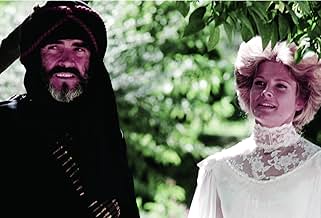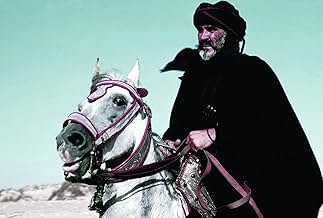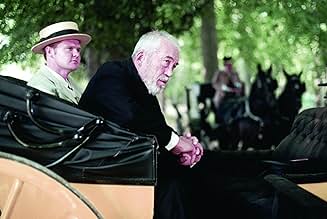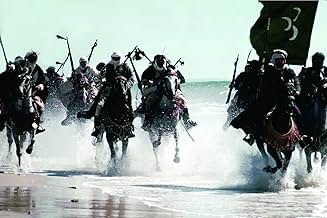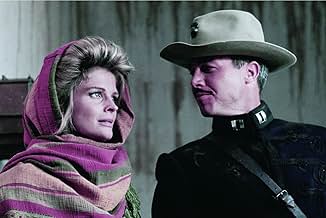CALIFICACIÓN DE IMDb
6.8/10
11 k
TU CALIFICACIÓN
Un líder Árabe crea un incidente internacional al secuestrar a una viuda estadounidense y a sus hijos.Un líder Árabe crea un incidente internacional al secuestrar a una viuda estadounidense y a sus hijos.Un líder Árabe crea un incidente internacional al secuestrar a una viuda estadounidense y a sus hijos.
- Dirección
- Guionista
- Elenco
- Nominado a 2 premios Óscar
- 6 nominaciones en total
Antoine Saint-John
- Von Roerkel
- (as Antoine St. John)
- Dirección
- Guionista
- Todo el elenco y el equipo
- Producción, taquilla y más en IMDbPro
Opiniones destacadas
'The Wind and the Lion' is, simply put, one of the greatest adventure films ever made, a classic that helped break the 'James Bond' stereotype for Sean Connery, solidified Brian Keith's reputation as one of America's finest character actors, and gave action-oriented director John Milius his most 'audience-friendly' success. It is a sweeping epic in the tradition of 'Lawrence of Arabia', without the earlier film's subtexts of megalomania and sexual ambiguity. Here, the personalities are clearly defined; they start off on opposing sides, but through the nobility of their characters, their unspoken codes of honor, and a sense of old-fashioned chivalry in a modern world of betrayal and greed, by the film's climax, they become allies against a greater evil.
Some critics attempted to link Theodore Roosevelt's world view in the film to the eventual U.S. debacle in Vietnam. That is unfair to both the film, and to Milius, who, if anything, admires and respects the 'big stick' idealism and machismo of our only true 'cowboy' President. (This respect led the director to film the excellent 'The Rough Riders', twenty-four years later, for TNT). Rest assured, 'The Wind and the Lion' is NOT a boring political treatise!
The setting is Morocco in 1904, where an American woman (Candice Bergen, in perhaps her best screen performance), and her two children are kidnapped by 'the last of the Barbary Pirates' Sean Connery and his large band of followers, who are seeking restitution for a long political imprisonment by his family. In Washington, dynamic young President Teddy Roosevelt (brilliantly portrayed by Brian Keith) uses the incident to send in American marines, both to rescue the family, and influence the country's politics (much to the chagrin of Secretary of State John Huston!) Privately, Roosevelt admires the Arab's courage and honor, and wishes the two could face off in a duel to resolve matters.
As her captivity continues, Bergen learns that the real villain is not Connery, who is truly the 'Chosen' leader of his people, but those who imprisoned him. The Americans discover this, too, as they see alliances being forged between the usurpers and greedy European powers, particularly Germany. Ultimately, this leads to a rip-roaring battle between the two forces, full of unforgettable images (Connery on horseback, at full gallop, snatching up a rifle offered by Bergen's son, is one of the great moments in film history!), as the film reaches a VERY satisfying conclusion.
There are many wonderful aspects to this film, and Jerry Goldsmith's rousing score must be singled out; it is one of the finest of his long career, ranking with his soundtracks for 'Star Trek: The Motion Picture', and 'Patton'.
'The Wind and the Lion' is the kind of epic adventure "they don't make anymore". Happily, John Milius has proven that cliche wrong. This film is ABSOLUTELY essential in any Connery or action film collection. I HIGHLY recommend it!
Some critics attempted to link Theodore Roosevelt's world view in the film to the eventual U.S. debacle in Vietnam. That is unfair to both the film, and to Milius, who, if anything, admires and respects the 'big stick' idealism and machismo of our only true 'cowboy' President. (This respect led the director to film the excellent 'The Rough Riders', twenty-four years later, for TNT). Rest assured, 'The Wind and the Lion' is NOT a boring political treatise!
The setting is Morocco in 1904, where an American woman (Candice Bergen, in perhaps her best screen performance), and her two children are kidnapped by 'the last of the Barbary Pirates' Sean Connery and his large band of followers, who are seeking restitution for a long political imprisonment by his family. In Washington, dynamic young President Teddy Roosevelt (brilliantly portrayed by Brian Keith) uses the incident to send in American marines, both to rescue the family, and influence the country's politics (much to the chagrin of Secretary of State John Huston!) Privately, Roosevelt admires the Arab's courage and honor, and wishes the two could face off in a duel to resolve matters.
As her captivity continues, Bergen learns that the real villain is not Connery, who is truly the 'Chosen' leader of his people, but those who imprisoned him. The Americans discover this, too, as they see alliances being forged between the usurpers and greedy European powers, particularly Germany. Ultimately, this leads to a rip-roaring battle between the two forces, full of unforgettable images (Connery on horseback, at full gallop, snatching up a rifle offered by Bergen's son, is one of the great moments in film history!), as the film reaches a VERY satisfying conclusion.
There are many wonderful aspects to this film, and Jerry Goldsmith's rousing score must be singled out; it is one of the finest of his long career, ranking with his soundtracks for 'Star Trek: The Motion Picture', and 'Patton'.
'The Wind and the Lion' is the kind of epic adventure "they don't make anymore". Happily, John Milius has proven that cliche wrong. This film is ABSOLUTELY essential in any Connery or action film collection. I HIGHLY recommend it!
A glorious adventure film, from the time when men were real men, women were real women, and American presidents were still hunting bears in Alaska instead of the oval office.
John Milius makes here the kind of macho film he really likes: we have bravado, honour, and charisma aplenty. The performances are excellent, as are the cinematography and the music. No deep messages here, but excellent entertainment all around. Film academies tend to ignore pictures like this in their award ceremonies but it is the kind of film that will stand the test of time.
John Milius makes here the kind of macho film he really likes: we have bravado, honour, and charisma aplenty. The performances are excellent, as are the cinematography and the music. No deep messages here, but excellent entertainment all around. Film academies tend to ignore pictures like this in their award ceremonies but it is the kind of film that will stand the test of time.
In 1904, a Greek-American named Perdicaris was taken hostage along with his step-son. His captor was a Moroccan chieftan named Raisuli and eventually the United States was able to secure the release of the men.
The film "The Wind and the Lion" is HEAVILY fictionalized version of the Perdicaris Affair. I say heavily because in order to 'sex it up', the film features a pretty woman (Candice Bergen) as Perdicaris and instead of a step-son, she's taken hostage with her two young children. What also is heavily fictionalized is the climactic battle at the end of the film.
So is it any good? Well, despite casting a Scottish actor as Raisuli and the writing for Mrs. Perdicaris being terrible, yes, it is very enjoyable. But as I just said, Mrs. Perdicaris was ridiculous. Imagine what you'd do if you were in this situation...would you yell and be a thorn in your captor' side?? No way...it would result in a quick trip to the afterlife! But the action is good and Brian Keiths flamboyant portrayal of Teddy Roosevelt is quite captivating. Well worth seeing....though it left me really wanting to see a film actually based on the Perdicaris kidnapping.
The film "The Wind and the Lion" is HEAVILY fictionalized version of the Perdicaris Affair. I say heavily because in order to 'sex it up', the film features a pretty woman (Candice Bergen) as Perdicaris and instead of a step-son, she's taken hostage with her two young children. What also is heavily fictionalized is the climactic battle at the end of the film.
So is it any good? Well, despite casting a Scottish actor as Raisuli and the writing for Mrs. Perdicaris being terrible, yes, it is very enjoyable. But as I just said, Mrs. Perdicaris was ridiculous. Imagine what you'd do if you were in this situation...would you yell and be a thorn in your captor' side?? No way...it would result in a quick trip to the afterlife! But the action is good and Brian Keiths flamboyant portrayal of Teddy Roosevelt is quite captivating. Well worth seeing....though it left me really wanting to see a film actually based on the Perdicaris kidnapping.
A movie I've seen and enjoyed possibly more than any other movie. I first saw it as a kid and loved the drama and the great climactic battle. As I got older, I enjoyed it as much or more than before, but now due to all of the components that work together to make a true classic. The acting is great (especially Keith as T. Roosevelt), the cinematography spectacular, the script is full of gems, and the directing pulls it all together wonderfully. It's loosely based on an actual event, and it shows rush of Europe and a newly emergent America to carve up the 'Sick old Man' (the Ottoman Empire) as it collapses in a fashion unlike any other 'historical' movie I've seen. Humor, drama, action, love...it's got it all and deserves far more acclaim (much like 'The Great Waldo Pepper').
We usually think of the British as the experts at rendering great adventure from the Imperial age, with the likes of The Four Feathers (1939) and Zulu, simply because the Imperial age was, for the most part, British. Here, in The Wind and the Lion, we see a wonderful rendering of America's own Imperial age.
America's projection of power under Teddy Roosevelt is the backdrop for this conventional tale of the kidnapped damsel who, despite her gentility, is smitten by the rough, manly nobility of her captor, who in turn is disarmed by her beauty and scorn. (Politically correct prigs eager to see some slight of "native" peoples or cultures can rest assured, that the way Arabs and Muslims are depicted here is far more flattering than the way their modern counterparts depict themselves on the current world stage.) What makes this story different are the terrific production values - faultless photography, composition and editing - the terrific casting - the underappreciated Brian Keith playing a bully Teddy - and vivid history.
Though The Wind and the Lion is told largely through the eyes of the son, every member of the family can identify with one of the characters, whether it be Sean Connery's noble brigand, Candace Bergen's feisty heroine, John Huston's wily John Hay or Steve Kanaly's spiffy, radiant, ruthless can-do lieutenant, Roosevelt's "Big Stick". There is a transcendent scene at the end, when the little boy is symbolically swept away by the dashing Moor on his white steed. This is high adventure at its best.
America's projection of power under Teddy Roosevelt is the backdrop for this conventional tale of the kidnapped damsel who, despite her gentility, is smitten by the rough, manly nobility of her captor, who in turn is disarmed by her beauty and scorn. (Politically correct prigs eager to see some slight of "native" peoples or cultures can rest assured, that the way Arabs and Muslims are depicted here is far more flattering than the way their modern counterparts depict themselves on the current world stage.) What makes this story different are the terrific production values - faultless photography, composition and editing - the terrific casting - the underappreciated Brian Keith playing a bully Teddy - and vivid history.
Though The Wind and the Lion is told largely through the eyes of the son, every member of the family can identify with one of the characters, whether it be Sean Connery's noble brigand, Candace Bergen's feisty heroine, John Huston's wily John Hay or Steve Kanaly's spiffy, radiant, ruthless can-do lieutenant, Roosevelt's "Big Stick". There is a transcendent scene at the end, when the little boy is symbolically swept away by the dashing Moor on his white steed. This is high adventure at its best.
¿Sabías que…?
- TriviaThe story was based on a historical incident involving the kidnapping of Ion Perdicaris, an American expatriate living in Tangier (changed to a woman for the movie). However, the two children, the American attack on the Bashaw's palace in Tangier, and the climactic battle between the American and German forces, were all inventions of writer and director John Milius.
- ErroresThe Raisouli and his followers pray while the muezzin is calling. In fact, the actual praying is done after the muezzin finishes - it's his job to remind the faithful to go pray. This is a common mistake in Hollywood productions, possibly done for dramatic purposes.
- Citas
Raisuli: To Theodore Roosevelt - you are like the Wind and I like the Lion. You form the Tempest. The sand stings my eyes and the Ground is parched. I roar in defiance but you do not hear. But between us there is a difference. I, like the lion, must remain in my place. While you like the wind will never know yours. - Mulay Hamid El Raisuli, Lord of the Riff, Sultan to the Berbers, Last of the Barbary Pirates.
- Créditos curiososOpening credits prologue: Tangier October 15, 1904 1:00 pm
- ConexionesFeatured in The Lion Roars Again (1975)
- Bandas sonorasFor He's A Jolly Good Fellow
(uncredited)
Traditional
Sung at Roosevelt's birthday party
Selecciones populares
Inicia sesión para calificar y agrega a la lista de videos para obtener recomendaciones personalizadas
- How long is The Wind and the Lion?Con tecnología de Alexa
Detalles
- Fecha de lanzamiento
- País de origen
- Idiomas
- También se conoce como
- John Milius' The Wind and the Lion
- Locaciones de filmación
- Productoras
- Ver más créditos de la compañía en IMDbPro
Taquilla
- Presupuesto
- USD 4,000,000 (estimado)
- Tiempo de ejecución1 hora 59 minutos
- Color
- Relación de aspecto
- 2.35 : 1
Contribuir a esta página
Sugiere una edición o agrega el contenido que falta

Principales brechas de datos
What is the French language plot outline for The Wind and the Lion (1975)?
Responda

